CGIAR EiA Initiative Learning Event

Rabat, Morocco, Dec 2022 – at the ICARDA-hosted Excellence in Agronomy (EiA) Learning Event, ICARDA’s Soil, Water, and Agronomy Research Team brought together partners and researchers to report, reflect, and synthesize on efforts to modernize agronomy research – the science of soil management and crop production.
Over 70 researchers from 10 CGIAR centers, EiA External Advisory Committee (EAC), Moroccan partners, and stakeholders gathered in Rabat for three days of deliberations. Opened by ICARDA Director General and CGIAR Regional Director of CWANA, Mr. Aly Abousabaa, INRA Morocco Director, Dr. Faouzi Bekkaoui, One CGIAR Managing Director - Resilient Agri-Food Systems, Dr. Martin Kropff, Bill & Melinda Gates Foundation (BMGF) Senior Program Officer, Dr. Christian Witt, and EiA Initiative lead and Deputy Director General of IITA, Dr. Bernard Vanlauwe, the meeting was an opportunity to take stock of efforts and lessons learned and enhance team building and enthusiasm of EiA colleagues.
“Investing in Initiatives such as EiA to address climate challenges now is a fraction of what investment will be needed in the future if we do not act. Our innovations for today are tomorrow’s solutions for the rest of the world. We can offer true South-North technology” - Mr. Aly Abousabaa, ICARDA Director General and CGIAR Regional Director of CWANA.
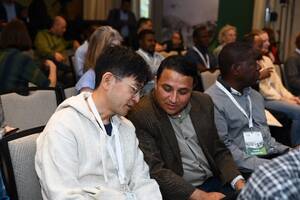
Excellence in Agronomy is a CGIAR initiative that aims to enhance the productivity and quality of farming for rural smallholder farmers by 2030 using proven technologies in agronomy, focusing on nutrition security, income, resource use, soil health, and climate resilience.
“The EiA Learning Event organized in Rabat was insightful and a good opportunity to collaborate and discuss CWANA Regional Initiative’s linkages with EiA regional and global activities.” - Krishna Devkota CGIAR CWANA Regional Initiative’s Sustainable Intensification Work Package Manager.
The session about Morocco’s conservation agriculture use case had a panel discussion with a third-generation farmer, a representative of World Bank Agriculture Practice, Credit Agricole Bank, CA farmers’ Cooperative President, APNI, UM6P, and farm machinery vendors’ association representative.
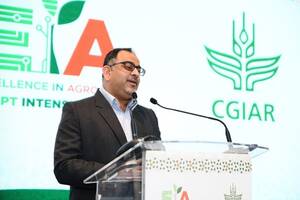
“The EiA Learning Event in Rabat was an excellent opportunity for ICARDA and the CWANA region to showcase our innovations and partnerships in developing and scaling demand-driven agronomy solutions for stakeholders of dry regions.” – Dr. Vinay Nangia, EiA CWANA Regional Lead, and ICARDA Focal Point.
ICARDA’s experts used the opportunity to share their latest findings since last year’s meeting and describe what they plan to investigate.
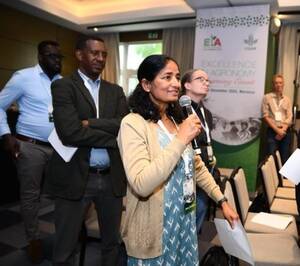
EiA Learning Event in Morocco provided me an excellent opportunity to discuss and exchange notes on scalable innovations and partnership with the team of agronomists gathered from different regions EiA operates in.” – Dr. Mina Devkota-Wasti, Agronomist ICARDA.
Colleagues from all CGIAR centers and partners reflected on critical aspects of expanding the agronomy-at-scale research portfolio. EiA Learning Event is the first step towards more synergy and partnerships to exchange rich research history across CGIAR centers on innovation in agronomy, soil science, and nutrient and water management systems.
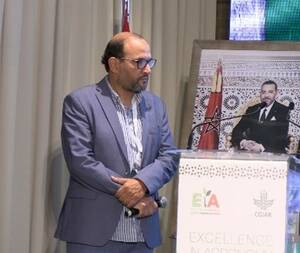
Rachid Moussadek (EiA Morocco Use Case Lead) adds, “It was a great opportunity to share knowledge and learnings between use cases from North Africa, Sub-Saharan Africa, Asia, and Latin America. This exchange of experiences will help to strengthen the farming systems by disseminating the best climate-resilient agronomic practices.”
In 2023 the EiA Team will redouble the efforts to develop agronomic adaptive strategies to strengthen smallholder farmers’ resilience to climate change. EiA aims to achieve agronomic gain for millions of women, men, and young smallholder farmers in the Global South by delivering data-driven agronomic solutions at scale with a positive impact on the CGIAR impact targets.
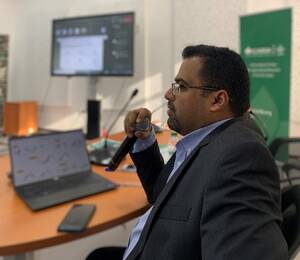
Ajit Govind (EiA Egypt Use Case Lead) explains, “The EiA Egypt Use case offers a suite of digital tools which can be a panacea for Egypt’s staggering agricultural sector. Multi-scale, multi-disciplinary, socially inclusive, bundled solutions that are being scaled through this with the right enabling environments could revolutionize the Egyptian agricultural sector like never before.”
